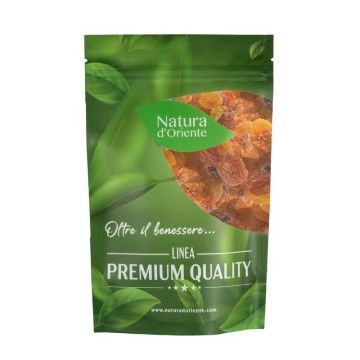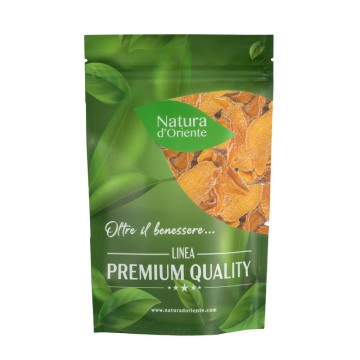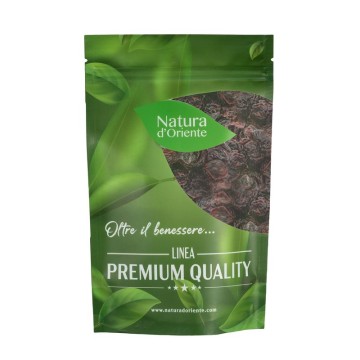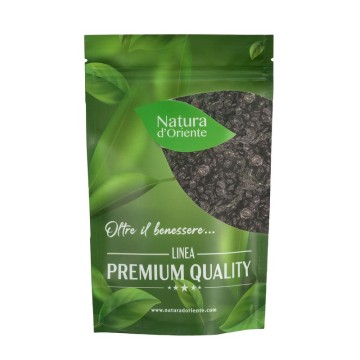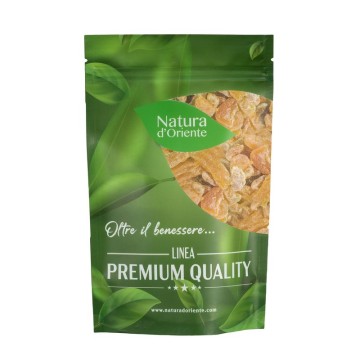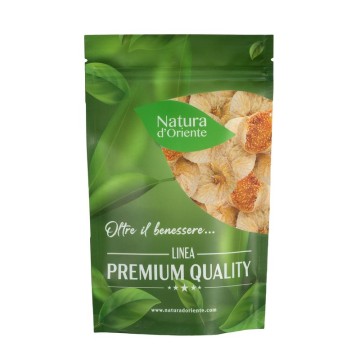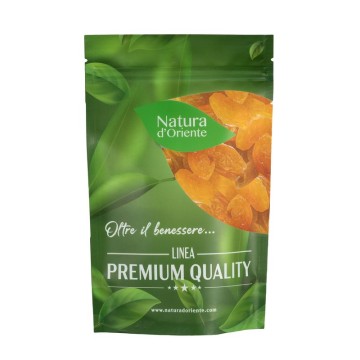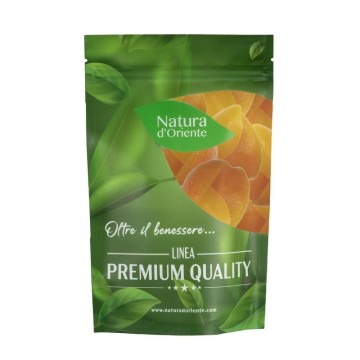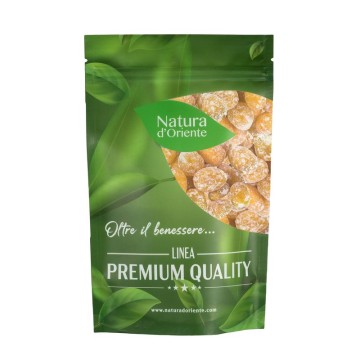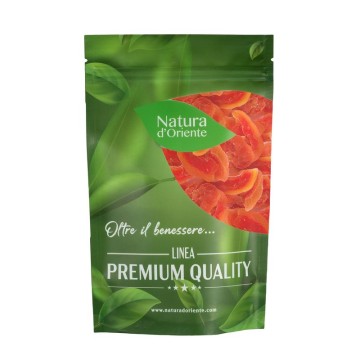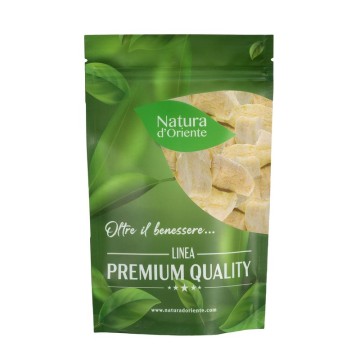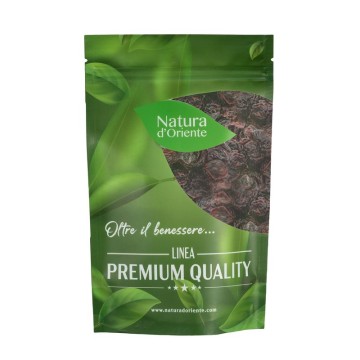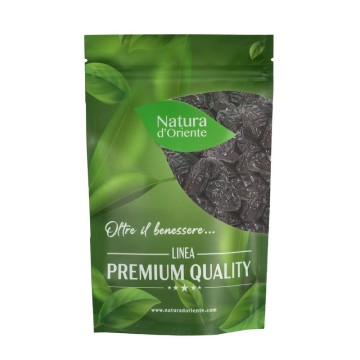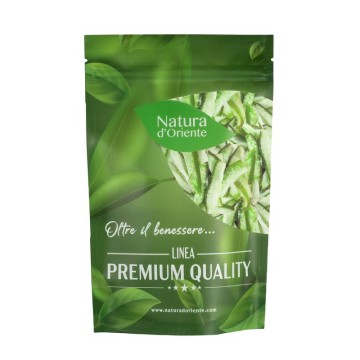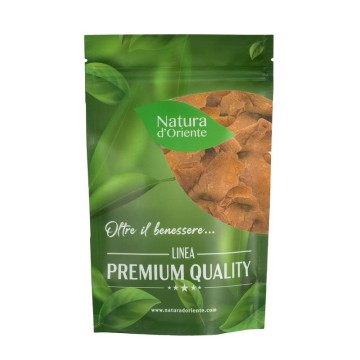Dehydrated dried peaches
This fruit is truly delicious in its dried version, and among the dried fruit it is one of the most sought after for its sweetness and as a hunger-breaking snack. Discover its beneficial characteristics, both in taste and in nutritional properties.
Dehydrated peaches: properties and benefits
Once dried, dried peaches without added sugar retains its characteristics that make it so tasty and healthy, as it contains fiber, vitamin C and beta-carotene. 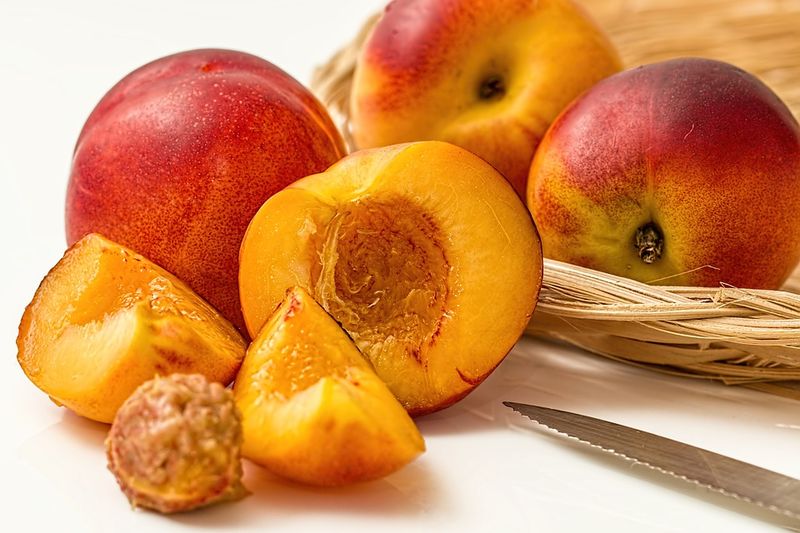 The vitamin C contained in peaches can strengthen the immune system, and counteract free radicals, which cause aging of the skin, cartilage and capillaries. In addition, this vitamin helps the body in the absorption of iron. Regarding the beta-carotene content, it is known that this vegetable element contained in dried peaches can be transformed in our body into vitamin A (thanks to the carotenase enzyme), bringing benefits to the skin, bones, teeth, and sight. At a food level, for those who want to include it in the diet, peach eaten dry, has slightly laxative and diuretic properties. In addition, it promotes the sense of satiety as a snack that satisfies and nourishes. It is necessary to carefully evaluate the doses, since dried or canned peaches with sugar syrup are more caloric and with less vitamin content than fresh ones. Peaches also contain many mineral salts, especially potassium, and the fiber level has in particular a high content of pectin, a soluble fiber that helps regulate intestinal functions and promote digestion.
The vitamin C contained in peaches can strengthen the immune system, and counteract free radicals, which cause aging of the skin, cartilage and capillaries. In addition, this vitamin helps the body in the absorption of iron. Regarding the beta-carotene content, it is known that this vegetable element contained in dried peaches can be transformed in our body into vitamin A (thanks to the carotenase enzyme), bringing benefits to the skin, bones, teeth, and sight. At a food level, for those who want to include it in the diet, peach eaten dry, has slightly laxative and diuretic properties. In addition, it promotes the sense of satiety as a snack that satisfies and nourishes. It is necessary to carefully evaluate the doses, since dried or canned peaches with sugar syrup are more caloric and with less vitamin content than fresh ones. Peaches also contain many mineral salts, especially potassium, and the fiber level has in particular a high content of pectin, a soluble fiber that helps regulate intestinal functions and promote digestion.
Origins and History of cultivation
The Peach tree as a plant has a history dating back over five thousand years. Its origin is probably Chinese , and the plant reached Europe through Persia, up to modern times in the American continent (16th century with the Spanish in South America and 17th century in California). In the nineteenth century the peach tree reached Australia and, only at the beginning of the twentieth century, was it also cultivated in Africa. The tree blooms in spring, giving a show thanks to its colors; flowers are often associated with fruits, to give good wishes for a long and prosperous life - in China the peach tree is a symbol of immortality. The name of the species derives from Persia: persica or perico, it is intended as apple or pomo perico (still present today in various Italian dialects). Today the peach tree is one of the most cultivated fruit trees in all countries with a temperate climate, especially in Italy. Our country is one of the largest producers, in fact about 80% of the peaches consumed fresh on the European market come from our country, especially from the regions of Veneto, Emilia - Romagna and Campania. Plant and Fruit Prunus persica is an arboreal plant with a large crown, and represents a species of the Rosaceae family. The edible fruit called peach usually grows abundantly in the plant's annual yields, which can ripen peaches for about 20 years. The fruits are usually red with yellow shades, in various shades, although there are varieties with more or less intense colors in these shades. The pulp is sweet, sometimes yellow and firm or white and juicier. The stone is not edible. The fruits are eaten fresh, or as dried dehydrated peaches, if not as peaches with the addition of syrup, called percoche.
Nutritional values of dehydrated dried peaches
Among dried fruit, peaches have excellent nourishing properties, thanks to the presence of sugars, proteins (1.7%), minerals and vitamins. Proteins are fundamental elements for tissue growth and repair, and cell regeneration. This version of dehydrated fruit contains average calories, kcal 307/100 grams as you can compare with the table below. Sugars provide energy to our body, while fats are few (1.1%). As we have said, in dried peaches the values of vitamin C, beta-carotene or precursor of vitamin A are good, as well as vitamins B, K and E with restorative and mineralizing properties.
How to consume or use dried peaches in the kitchen
The dehydrated version of peaches is often used as a diet or energy snack . It is also included in recipes, in which dehydrated dried peaches give sweetness in the preparation of desserts, in dried fruit and cereal mixes, in smoothies, fruit salads and ice creams, in fruit drinks or vegetable milk. The dehydrated peach chips </ strong
> they are also used in the creation of energy bars for athletes.
Dehydrated peaches: side effects and contraindications
There are no particular contraindications to taking dried fruit chips such as dehydrated peaches but by exceeding the correct quantities, you risk the laxative effect. Another fact to keep in mind is the possible food intolerance of peaches, or an allergy to the fruit. Another warning for the consumption of dried peaches concerns people with diabetes, as these fruits are high in sugar, and can increase blood sugar levels.
![]()

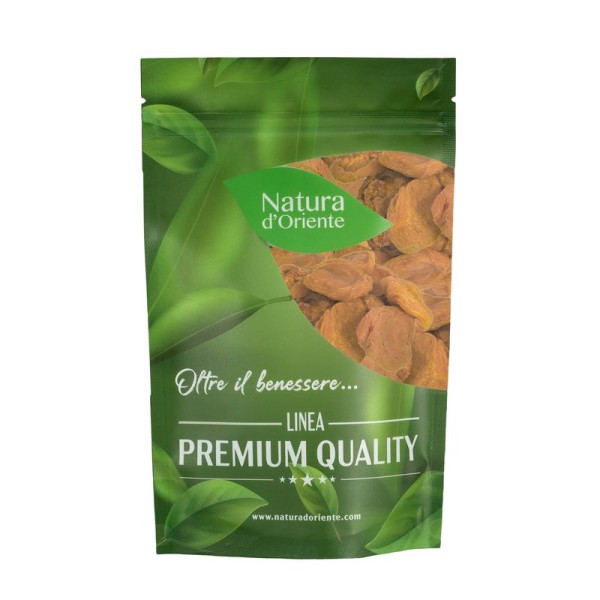









 No reward points for this product.
No reward points for this product.
 The vitamin C contained in peaches can strengthen the immune system, and counteract free radicals, which cause aging of the skin, cartilage and capillaries. In addition, this vitamin helps the body in the absorption of iron. Regarding the beta-carotene content, it is known that this vegetable element contained in dried peaches can be transformed in our body into vitamin A (thanks to the carotenase enzyme), bringing benefits to the skin, bones, teeth, and sight. At a food level, for those who want to include it in the diet, peach eaten dry, has slightly laxative and diuretic properties. In addition, it promotes the sense of satiety as a snack that satisfies and nourishes. It is necessary to carefully evaluate the doses, since dried or canned peaches with sugar syrup are more caloric and with less vitamin content than fresh ones. Peaches also contain many mineral salts, especially potassium, and the fiber level has in particular a high content of pectin, a soluble fiber that helps regulate intestinal functions and promote digestion.
The vitamin C contained in peaches can strengthen the immune system, and counteract free radicals, which cause aging of the skin, cartilage and capillaries. In addition, this vitamin helps the body in the absorption of iron. Regarding the beta-carotene content, it is known that this vegetable element contained in dried peaches can be transformed in our body into vitamin A (thanks to the carotenase enzyme), bringing benefits to the skin, bones, teeth, and sight. At a food level, for those who want to include it in the diet, peach eaten dry, has slightly laxative and diuretic properties. In addition, it promotes the sense of satiety as a snack that satisfies and nourishes. It is necessary to carefully evaluate the doses, since dried or canned peaches with sugar syrup are more caloric and with less vitamin content than fresh ones. Peaches also contain many mineral salts, especially potassium, and the fiber level has in particular a high content of pectin, a soluble fiber that helps regulate intestinal functions and promote digestion.
